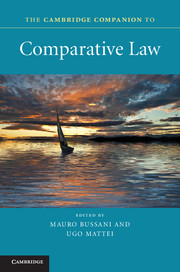Book contents
- Frontmatter
- Contents
- Contributors
- Abbreviations
- Preface
- Part I Knowing comparative law
- 1 Comparative law and neighbouring disciplines
- 2 Political ideology and comparative law
- 3 Economic analysis and comparative law
- 4 Comparative law and anthropology
- 5 Comparative law and language
- Part II Comparative law fields
- Part III Comparative law in the flux of civilizations
- Index
- References
4 - Comparative law and anthropology
Published online by Cambridge University Press: 05 May 2013
- Frontmatter
- Contents
- Contributors
- Abbreviations
- Preface
- Part I Knowing comparative law
- 1 Comparative law and neighbouring disciplines
- 2 Political ideology and comparative law
- 3 Economic analysis and comparative law
- 4 Comparative law and anthropology
- 5 Comparative law and language
- Part II Comparative law fields
- Part III Comparative law in the flux of civilizations
- Index
- References
Summary
The encounter of anthropology and law
Anthropology is a schizophrenic discipline. Often riven by mutually excluding factions and orientations – sometimes embodied in rival sub-disciplines, sometimes displayed over the course of a single individual’s career – the main fault line commonly separates claims of cultural uniqueness from claims to the discovery of universal features of human social and conceptual life. To some the question is not unlike that posed in philosophy and other disciplines: are human communities so incommensurable as to frustrate any useful generalizations, or may one overcome this seeming diversity by the discovery of deeper structures and principles that demonstrate unity at the level from which variation is itself generated? From the side of the particularists comes the claim that such generalizations are either trivial or untrue; from the side of the universalists comes a set of theories – functionalist, structuralist, evolutionary – each of which may claim total explanatory power. Whether the particular domain for pursuing this debate lies in a sub-field of the economic, the familial, the political, or the religious, the capacity of the ideas generated in one domain to contribute to the broader issues raised in the discipline as a whole are, notwithstanding the more exaggerated claims, often simultaneously significant and limited. Nowhere is this truer than in the contributions of anthropology to the study of law.
- Type
- Chapter
- Information
- The Cambridge Companion to Comparative Law , pp. 73 - 87Publisher: Cambridge University PressPrint publication year: 2012
References
- 3
- Cited by

